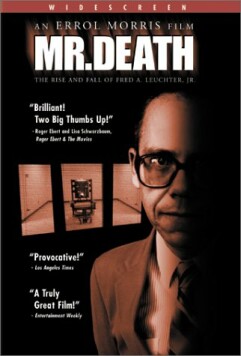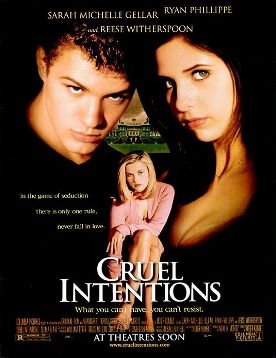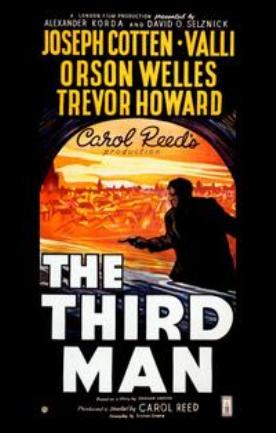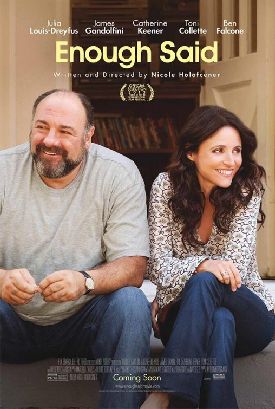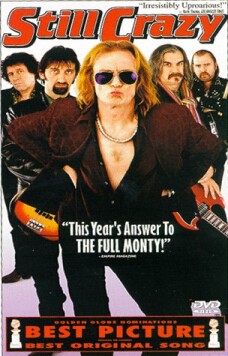Mr. Death: The Rise and Fall of Fred A. Leuchter, Jr.
Errol Morris’s fascinating documentary, Mr Death: The Rise and Fall of
Fred A Leuchter, Jr. is another chapter in the long and tragic history of
the great American autodidact. Like so many of those immensely likeable and
distinctively American “characters” who believe that they can reinvent the
world, Fred is ultimately swallowed up by the bad intellectual habits that such
a belief tends to engender: the hermeticism of those who imagine that they are
privy to hidden—if not forbidden—knowledge and the gnosticism of
those who suppose that such knowledge will give them godlike powers. Perhaps
Fred’s trouble is that he got used to the godlike powers quite early on in life,
as a designer of execution equipment, and so found it natural to proceed to the
hidden knowledge.
For Morris shows Fred one day happily designing electric chairs, gas
chambers, gallows and lethal injection systems for various state
governments—and shrewdly observing that his self-taught expertise in the
designing of one is not in itself a reason for supposing that he knows anything
about designing the others (though fortunately he does)—and the next a
ruined man, undone by the one man not involved with a state penal system who
flatters him by treating him as an expert. This is Ernst Zündel, a
Holocaust denier who calls on Fred as an expert witness in his trial under
Canadian law for inciting racial hatred.
Fred, with little more idea of what he is doing than anyone picked up off the
street might have had, travels to Auschwitz in order surreptitiously to lift
samples of brick and cement from the remaining gas chambers there. Returning to
the U.S., he submits these samples for chemical analysis to see if there are any
traces of cyanide gas in them. There are not, and he triumphantly concludes, on
the Canadian witness stand and under oath, that people could not have been
executed in those chambers, as is alleged by virtually the entire historical
profession, to say nothing of a great many eye-witnesses who managed to survive
the experience.
Without comment, Morris puts on the screen a scientist who performed the
analysis to explain why it proved nothing. The gas would have penetrated the
brick only to a depth of a few paltry microns, says the technician, and Fred had
not thought to specify which bits of brick, now all ground up together, were
from the side facing the chamber. The lab’s task had been “like analyzing paint
on the wall by looking at the timbers behind it.” But, Fred, with the
enthusiastic support of Zündel, who continues to flatter him by comparing
him to George Washington and Thomas Jefferson, sticks to his intellectual guns.
As a result, he loses all his state contracts for designing execution equipment
and his wife leaves him.
Yet what is most memorable about this movie is in many ways the comically
clinical way in which Leuchter talks of his passion for what strikes most of us
as the gruesome details of judicial murder. With a botched electrocution, he
cheerfully informs Morris’s camera, “The meat comes off the executee’s body like
a chicken.” The word “executee” is almost as disgustingly funny as the simile.
In the same way, he talks about his ideal site for lethal injections as if it
were a dentist’s office, with “a contour chair, television, music, pictures on
the wall.” This is what he thinks of as “humane”—which lends a certain
piquancy to the unconscious humor of his saying that, technically, “there’s no
difference in a life support system and an execution system” or that “the warden
is in many respects the surrogate father of the man being executed.”
Getting to know this absurd little man—the fact, for instance, that he
claims to drink 40 cups of coffee and to smoke six packs of cigarettes a
day—is a necessary prelude to the spectacle of his uncomprehending ruin on
taking up the cause of Holocaust denial. Life to him is a series of engineering
problems which he is unshakably confident of his ability to solve, but the
nature of those problems, together with his glib talk of the “humane”
considerations in solving them, shows us a man with no self-knowledge, no sense
of irony and thus no ability to avoid the fate which ultimately overtakes him.
There is a terrible but at the same time comic pathos in his advertising in a
suburban shopping paper a lethal injection machine he had built before the order
was canceled. “Anybody who’s interested in buying a lethal injection machine can
contact me,” he says.
The historian David Irving, who is currently fighting his own battle to avoid
the professionally deadly label of Holocaust denier, is interviewed on camera,
calling Leuchtner “a mouse of a man….totally innocent; innocent in the sense
of being a simpleton.” In taking up Zündel’s invitation, says Irving, he
“had no idea what he was blundering into. . .He didn’t put his name on the line
because he had no name. He came out of nowhere and went back to nowhere.” But
you really should try to catch him in Morris’s film before he slips away for
good.
Discover more from James Bowman
Subscribe to get the latest posts to your email.

